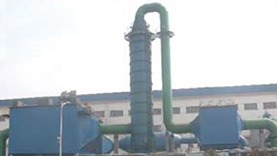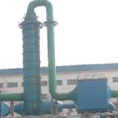
资讯中心
NEWS
Dozens of new policies issued and various funds competed for environmental protection industry
2020-06-04 13:42:36
With the rapid development of the world economy, the global energy consumption is increasing explosively. The reserves of non renewable energy are decreasing at the rate of 15 billion tons of standard coal per year. The scarcity of energy makes the energy problem become the energy strategy problem of all countries in the world.
Under the current situation, the contradiction between China's increasing energy consumption and unreasonable energy consumption mode and consumption structure is becoming more and more prominent. In recent years, all sectors of society, including the international community, have paid high attention to energy conservation and emission reduction in China.
As the main force of energy conservation and emission reduction, energy-saving service companies have developed rapidly. According to the 2016 energy saving service industry development report issued by the energy saving service industry committee (EMCA), as of By the end of 2016, the number of enterprises engaged in energy-saving service industry reached 5816, with 652000 employees, a total value of 356.742 billion yuan in energy-saving service industry, a contract energy management investment of 107.355 billion yuan, forming an annual energy-saving capacity of 35.785 million tons of standard coal and an annual carbon dioxide reduction capacity of 95.9038 million tons. It is estimated that by 2020, the total output value of energy-saving service industry will reach 600 billion yuan. According to statistics, in 2016, the average registered capital of energy-saving service companies was 34.69 million yuan, which was about 16 million yuan compared with the average registered capital of energy-saving service companies on record, and the enterprise scale was significantly improved.
In 2016, facing the complex and changeable international environment and the arduous domestic reform and development trend, the energy-saving service industry, as a strategic emerging industry, continued to develop and expand, showing the characteristics of innovation, high technology and high added value, playing an important role in promoting the steady economic growth of China, and achieving a good start of the 13th five year plan. However, it can not be ignored that with the deepening of energy conservation and emission reduction, there are still some problems to be solved in all departments, such as "central heat, local cold"

Do a good job in top-level design and conscientiously implement various policies and measures
2016 is the first year of the 13th five year plan. Our government has successively supported many important documents for energy conservation and emission reduction. Among them, the comprehensive work plan for energy conservation and emission reduction during the 13th five year plan, the development plan for energy conservation and environmental protection industry during the 13th five year plan, and the national energy conservation action plan during the 13th five year plan put forward to vigorously promote the contract energy management mode, carry out the doubling action for energy conservation service industry, and make the energy conservation service industry bigger and stronger. The examination and filing system of energy-saving service companies shall be cancelled, and no place or unit shall restrict the business of an enterprise with the qualification of examination and filing of energy-saving service companies. At the same time, it is proposed that by 2020, the energy conservation and environmental protection industry will become a major pillar industry of the national economy, with the added value of the industry accounting for about 3% of the GDP, and the energy conservation capacity of 80 million tons of standard coal will be formed during the 13th Five Year Plan period.
In terms of policy implementation, there are still some problems in some places, such as inadequate understanding of energy conservation and emission reduction, unclear responsibilities, incomplete measures, imperfect policies, unfulfilled investment and ineffective coordination. If this situation can not be reversed in time, not only the task of energy conservation and emission reduction can not be completed this year, but also the more detailed work of energy conservation and emission reduction during the 13th five year plan will be difficult to carry out. Energy saving and emission reduction is not only a realistic and urgent work, but also a long-term and arduous task. The key to achieve the goals, tasks and policy measures of energy conservation and emission reduction is to strengthen leadership and implement them. If we don't implement it, the perfect plan will be a dead letter. No matter how clear the goal is, it's hard to achieve it. No matter how good the policy is, it's hard to play a role.
In the second year of the 13th five year plan, the Chinese government has been continuously building and improving the energy-saving service system, and at the same time, it is also actively doing in improving the supporting policies, standardizing the industry development, and expanding the service field. It can be seen that the national energy conservation and emission reduction efforts are greater, and there is no change in the policy of implementing the contract energy management to support the energy-saving service industry. The energy-saving and emission reduction market has great achievements, and the development of the energy-saving service industry still has broad space. The 13th Five Year Plan period is still a period of strategic development opportunities for energy-saving service industry.

The key to energy saving in the future lies in "energy efficiency improvement"
Facing the severe situation of energy and environment, the development and utilization of new energy, the use of energy-saving technology, and the strengthening of enterprise energy-saving management are important measures of energy revolution. In February 2016, NEA passed the key points of NEA's system reform in 2016, which laid out seven key tasks on the energy supply side in the process of comprehensively deepening the reform, and clarified the outstanding problems faced by the energy development in the new normal, such as the overcapacity of traditional energy, the bottleneck restriction of renewable energy development, and the low overall operation efficiency of the energy system.
In the relevant plans jointly issued by the national development and Reform Commission, the Ministry of Finance and other ministries, as well as the national energy conservation action plan of the 13th five year plan, it is clearly proposed to carry out energy conservation action industry multiplication action. It can be seen that energy-saving service companies will play an increasingly important role in China's development and transformation process, whether it is to cope with climate change, improve economic quality and efficiency, achieve total energy consumption control, or change development mode, build ecological civilization.
In addition, internationally, in recent years, countries all over the world have increased investment in research and development of energy consumption and energy efficiency efficiency, promoting the development of energy conservation and environmental protection. Since the G20 energy efficiency action plan in 2014, China has fully participated in the planning and practice of energy efficiency voluntary cooperation among G20 member countries. Subsequently, at the G20 summit, leaders approved the G20 energy efficiency leading plan, highlighting the importance that countries attach to energy efficiency improvement. One belt, one road, and South South cooperation will be the key to China's energy saving service companies. It will help enterprises expand their international markets and bring products, technologies and services to the developing countries. Standing at the beginning of the 13th five year plan, only by continuously optimizing the energy structure of our country can we lay the foundation for the sustainable development of our energy industry and promote our economy to enter a new era.
























